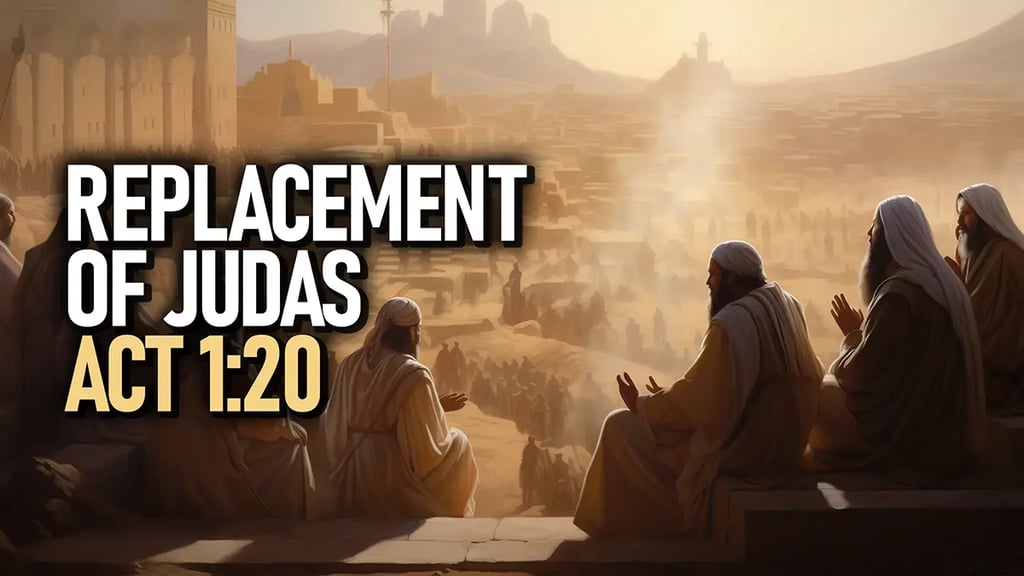Replacement Of Judas - Explaining Act 1:20


Acts 1:20
Acts 1:20-26 – For it is written in the book of Psalms, Let his habitation be desolate, and let no man dwell therein: and his bishoprick let another take. Wherefore of these men which have companied with us all the time that the Lord Jesus went in and out among us, Beginning from the baptism of John, unto that same day that he was taken up from us, must one be ordained to be a witness with us of his resurrection. And they appointed two, Joseph called Barsabas, who was surnamed Justus, and Matthias. And they prayed, and said, Thou, Lord, which knowest the hearts of all men, shew whether of these two thou hast chosen, That he may take part of this ministry and apostleship, from which Judas by transgression fell, that he might go to his own place. And they gave forth their lots; and the lot fell upon Matthias; and he was numbered with the eleven apostles.
A UNIQUE EVENT FOR JUDAS' REPLACEMENT
The primary reason for selecting Matthias was to maintain the number of 12 apostles, fulfilling Jesus' original appointment of 12 (Matthew 10:1-4, Luke 6:13-16). This number symbolically represents the 12 tribes of Israel. After Matthias, there are no instructions for replacing apostles as they die.
NO DIRECT COMMAND FOR SUCCESSION
Nowhere in the New Testament is there a command for the continuous replacement of apostles as part of church practice. The selection of Matthias is presented as a one-time event to replace Judas, who betrayed Jesus and left his office vacant. Other apostles, like James, die later (Acts 12:2), but there is no indication of replacing them.
ROLE OF THE APOSTLES
The twelve apostles were eyewitnesses of Jesus' resurrection (Acts 1:22, 1 Corinthians 15:8-9). The qualifications for apostleship were specific to those who had seen Jesus in person, making it difficult to extend this office to future generations who have not had this experience (Acts 1:21-22).
FOUNDATION ALREADY LAID
Paul writes that the church is "built on the foundation of the apostles and prophets, with Christ Jesus Himself as the cornerstone." This suggests that the apostles had a foundational role in the early church, and once this foundation is laid, there is no need for continuous replacement.
1 Corinthians 3:11 – For other foundation can no man lay than that is laid, which is Jesus Christ.
The text itself does not explicitly state or imply that this process would be repeated in the future or establish a system for ongoing succession. It describes a one-time event.
Bishop
The Greek word "episkopē," which appears in both Acts and 1 Timothy, does not suggest that the roles of apostle and bishop are equivalent.
Acts 1:20 – For it is written in the book of Psalms, Let his habitation be desolate, and let no man dwell therein: and his bishoprick (position, office) [episkopē] let another take.
1 Timothy 3:1 – This is a true saying, If a man desire the office of a bishop [episkopē], he desireth a good work.
Bishops were not successors of apostles, they are not even the same greek word.
Ephesians 4:11 – And he gave some, apostles (apostolos); and some, prophets; and some, evangelists; and some, pastors and teachers;
While the term ἐπισκοπή (episkopē) is indeed used in both Acts and 1 Timothy, its application in these contexts does not imply that the office of a bishop is the same as that of an apostle.
📜 BISHOP
episkopē (ep-is-kop-ay')
From G1980; inspection (for relief); by implication superintendence; specifically the Christian “episcopate”: - the office of a “bishop”, bishoprick, visitation.
NEW AMERICAN STANDARD EXHAUSTIVE CONCORDANCE (NASEC)
episkopē; from 1980a; a visiting, visitation; office of overseer:— office(1), office of overseer(1), visitation(2).
Thayer Definition:
1) investigation, inspection, visitation
1a) that act by which God looks into and searches out the ways, deeds character, of men, in order to adjudge them their lot accordingly, whether joyous or sad
1b) oversight
1b1) overseership, office, charge, the office of an elder
1b2) the overseer or presiding officers of a Christian church
In Acts, episkopē refers to the "office" or "position" that Judas Iscariot held among the apostles, signifying the apostolic role that needed to be filled. The focus is on appointing a replacement for Judas within the apostolic ministry.
In 1 Timothy, however, episkopē describes the "office of a bishop" or "overseer," outlining the responsibilities and qualifications required for this role, essentially the episcopal office. Here, the emphasis is on the duties and standards of a bishop.
Apostles: The original apostles were directly chosen by Jesus Christ to bear witness to His resurrection and to spread the Gospel. They held a unique position in the early Church.
Bishops (Overseers): As the Church grew, bishops were appointed to provide leadership and oversight to local congregations. Although the apostles appointed bishops to continue their work, the terms "bishop" (episkopos) and "apostle" (apostolos) became distinct roles within the Church hierarchy.
Therefore, while episkopē is associated with both apostles and bishops, its usage does not equate the two roles. The context of each passage clarifies the specific office being referred to, and the early Church distinguished between apostolic and episcopal functions.
Symbolic Of The 12 Tribes
Genesis 49:28 – All these are the twelve tribes of Israel: and this is it that their father spake unto them, and blessed them; every one according to his blessing he blessed them.
Exodus 24:4 – And Moses wrote all the words of the LORD, and rose up early in the morning, and builded an altar under the hill, and twelve pillars, according to the twelve tribes of Israel.
Numbers 17:2 – Speak unto the children of Israel, and take of every one of them a rod according to the house of their fathers, of all their princes according to the house of their fathers twelve rods: write thou every man's name upon his rod.
Revelation 21:12-14 – And had a wall great and high, and had twelve gates, and at the gates twelve angels, and names written thereon, which are the names of the twelve tribes of the children of Israel: On the east three gates; on the north three gates; on the south three gates; and on the west three gates. And the wall of the city had twelve foundations, and in them the names of the twelve apostles of the Lamb.
Other Symbolism Examples
Leviticus 24:5 – And thou shalt take fine flour, and bake twelve cakes thereof: two tenth deals shall be in one cake.
Numbers 7:86-87 – The golden spoons were twelve, full of incense, weighing ten shekels apiece, after the shekel of the sanctuary: all the gold of the spoons was an hundred and twenty shekels. All the oxen for the burnt offering were twelve bullocks, the rams twelve, the lambs of the first year twelve, with their meat offering: and the kids of the goats for sin offering twelve.
Numbers 33:9 – And they removed from Marah, and came unto Elim: and in Elim were twelve fountains of water, and threescore and ten palm trees; and they pitched there.
Joshua 4:9 – And Joshua set up twelve stones in the midst of Jordan, in the place where the feet of the priests which bare the ark of the covenant stood: and they are there unto this day.
Matthew 26:53 – Thinkest thou that I cannot now pray to my Father, and he shall presently give me more than twelve legions of angels?
I created a comprehensive guide covering every topic, with every verse you need, download here. If you would like to support my ministry you can do so by donating here or subscribing to my Patreon.
Grace be with all them that love our Lord Jesus Christ in sincerity. Amen.
- The Christian King


